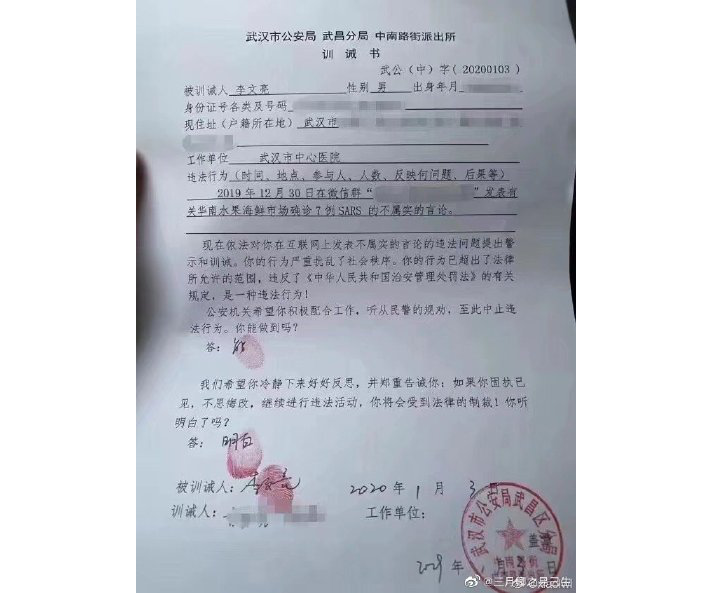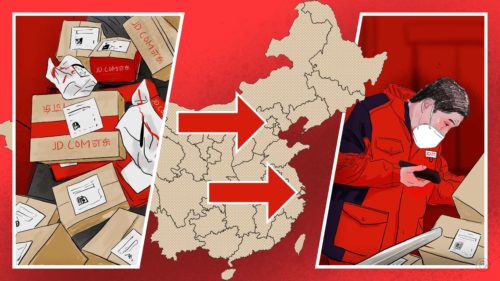China to investigate ‘issues’ related to Li Wenliang’s death
Wuhan, and all of China, continue to react to the death of a man who was earlier silenced for trying to warn about the coming epidemic.

A picture of the “admonishment notice” (训诫书 xùnjiè shū) that Wuhan police forced Lǐ Wénliàng 李文亮 to sign on January 3.
As we wrote yesterday, the death of doctor Lǐ Wénliàng 李文亮 on early Friday morning Beijing time has crystallized public resentment toward Chinese authorities and their response to the outbreak. The South China Morning Post describes how Wuhan, and the country, continue to react to the death of a man who was earlier silenced for trying to warn about the coming epidemic:
On Friday, dozens of mourners – some of them medical workers – put flowers and black-and-white photos of Li at the entrance to Wuhan Central Hospital where he worked…
On Thursday night and Friday morning, three rapidly trending social media hashtags – “The Wuhan government owes Li Wenliang an apology”, “I want freedom of speech” and “We want freedom of speech” – were seen millions of times before they were censored…
Meanwhile, the Wuhan government paid a belated tribute to Li, praising him for his work fighting the outbreak.
“We express our deep condolences and regrets,” it said in a statement. “We pay tribute to [Li] sticking to the front line in fighting the epidemic, and offer our sincere condolences to his family.”
The China Digital Times has a complete translation of the “admonishment notice” (训诫书 xùnjiè shū) that Li was forced to sign on January 3, saying that he “can” (能 néng) cooperate with the police and stop his illegal rumor-mongering, and “understands” (明白 míngbai) that he will be punished if he continues to stubbornly “carry out illegal activities.”
One of many common messages of simple protest by citizens remembering Li has been to post, “Can’t. Don’t understand.” (不能。不明白。bù néng bù míngbai).
Beijing quickly realized how seriously upset millions of Chinese people were, and has begun the process of finding a scapegoat for the disturbance of social order. NPR reports:
After the announcement of his death Friday, China’s National Supervisory Commission, the country’s top anti-corruption body, said it would send a team to Wuhan to “thoroughly investigate issues related to Dr. Li Wenliang,” according to the official Xinhua news agency.
The report did not specify what exactly would be investigated, but it comes within a broader context of growing criticism of Beijing for its handling of the crisis. China was initially praised for being quicker to seek international help than it did during the SARS outbreak; however, in recent days it has become more clear that in the initial phase of the epidemic, authorities may have been less than transparent.
For more on this remarkable moment in Chinese political life, see:
- Rare online revolt emerges in China over death of coronavirus whistle-blower / NYT (porous paywall)
- In China, anger simmers over coronavirus doctor’s death / WSJ (paywall)
- ‘Hero who told the truth’: Chinese rage over coronavirus death of whistleblower doctor / Guardian
- Doctor’s death from coronavirus sparks a digital uprising, rattling China’s leaders / Washington Post
More coronavirus updates
The official infection count is now more than 31,000, and 638 are reported dead. Twenty of those deaths are outside of Hubei Province, and two are outside of mainland China.
Japan now has the largest number of cases outside of China, as a cruise ship was quarantined off the coast of Yokohama with 61 confirmed cases among passengers, Nikkei Asian Review reports.
Local authorities in Wuhan are using “increasingly extreme measures…to try to halt the spread of the deadly coronavirus, ordering house-to-house searches, rounding up the sick and warehousing them in enormous quarantine centers,” the New York Times reports.
On the ground in Wuhan, Chris Buckley of the New York Times has a photo essay called “How to survive in an outbreak,” which provides a look at daily life on the streets and in the hospitals of the city.
A citizen journalist has gone missing. Chén Qiūshí 陈秋实 was posting regular updates from Wuhan on Twitter until recently. A post on Chen’s account indicates that his family has been unable to contact him for 36 hours, as of this newsletter writing. Another citizen journalist, Fāng Bīn 方斌, who “was silent much of Friday until a video posted in the evening, was previously detained briefly by authorities for his video of corpses in a hospital,” per Bloomberg.
“Chinese have long been aware that they are tracked by the world’s most sophisticated system of electronic surveillance. The coronavirus emergency has brought some of that technology out of the shadows, providing the authorities with a justification for sweeping methods of high tech social control,” Reuters reports. As one example, facial recognition company Megvii said that it “had developed a new way to spot and identify people with fevers, with support from the industry and science ministries.”
—Lucas Niewenhuis






